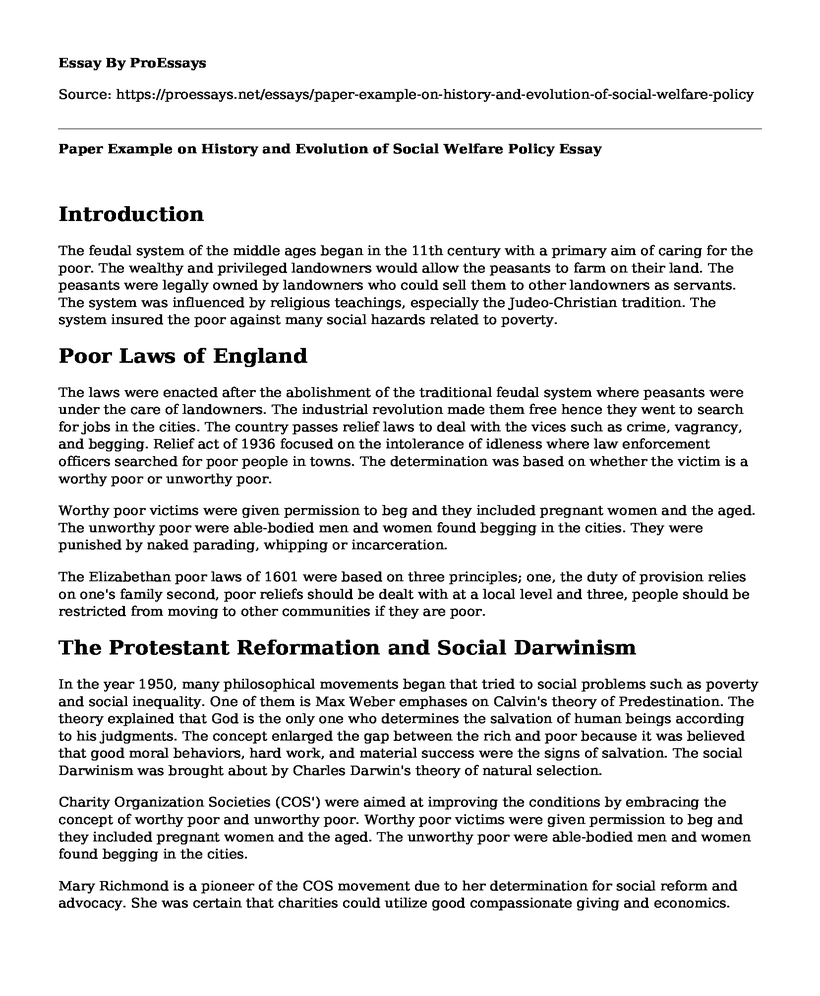Introduction
The feudal system of the middle ages began in the 11th century with a primary aim of caring for the poor. The wealthy and privileged landowners would allow the peasants to farm on their land. The peasants were legally owned by landowners who could sell them to other landowners as servants. The system was influenced by religious teachings, especially the Judeo-Christian tradition. The system insured the poor against many social hazards related to poverty.
Poor Laws of England
The laws were enacted after the abolishment of the traditional feudal system where peasants were under the care of landowners. The industrial revolution made them free hence they went to search for jobs in the cities. The country passes relief laws to deal with the vices such as crime, vagrancy, and begging. Relief act of 1936 focused on the intolerance of idleness where law enforcement officers searched for poor people in towns. The determination was based on whether the victim is a worthy poor or unworthy poor.
Worthy poor victims were given permission to beg and they included pregnant women and the aged. The unworthy poor were able-bodied men and women found begging in the cities. They were punished by naked parading, whipping or incarceration.
The Elizabethan poor laws of 1601 were based on three principles; one, the duty of provision relies on one's family second, poor reliefs should be dealt with at a local level and three, people should be restricted from moving to other communities if they are poor.
The Protestant Reformation and Social Darwinism
In the year 1950, many philosophical movements began that tried to social problems such as poverty and social inequality. One of them is Max Weber emphases on Calvin's theory of Predestination. The theory explained that God is the only one who determines the salvation of human beings according to his judgments. The concept enlarged the gap between the rich and poor because it was believed that good moral behaviors, hard work, and material success were the signs of salvation. The social Darwinism was brought about by Charles Darwin's theory of natural selection.
Charity Organization Societies (COS') were aimed at improving the conditions by embracing the concept of worthy poor and unworthy poor. Worthy poor victims were given permission to beg and they included pregnant women and the aged. The unworthy poor were able-bodied men and women found begging in the cities.
Mary Richmond is a pioneer of the COS movement due to her determination for social reform and advocacy. She was certain that charities could utilize good compassionate giving and economics.
Jane Addams and the Settlement House Movement
Addams advocated for social changes and she began the United States settlement house in the 1880s. She had passion in alienating social inequality and poverty. The movement changed how the poor were perceived and cared for in the society. They integrated into the American society because there was a voice to advocate for their views.
The New Deal and the Social Security Act of 1935
To improve the economic conditions in the United States, President Hoover created federal systems of social welfare. The Civil Works Administration was helpful because it created more than one million jobs for the poor. The Social Security Act of 1935 also provided assistance to the aged, unemployment reimbursement, and assistance to disabled and single mothers. The Federal Deposit Insurance Corporation (FDIC) was a program that insured deposits made in banks to restore the confidence of the system. It also regulated the stock market.
Influences of African-American Social Workers
Racism was a major hindrance to social work but this was changed with the emergence of black social workers. They worked in tight societies and created strong relationships with black people. They mainly focused on education opportunities (Ida Wells) and health services (Modjeska Simkins).
Welfare Reform and the Emergence of Neoliberal Economic Policies
In 1980s democratic and republican supported punitive welfare changes. There was a strong belief that free markets and capitalization were the solutions to many social problems.
Cite this page
Paper Example on History and Evolution of Social Welfare Policy. (2022, Jul 11). Retrieved from https://proessays.net/essays/paper-example-on-history-and-evolution-of-social-welfare-policy
If you are the original author of this essay and no longer wish to have it published on the ProEssays website, please click below to request its removal:
- The Economic Implications of Government Control Over the Interest Rates Essay
- Mental Health Professional Interview on Psychology of Married Couples
- Ethics in Social Work Essay Example
- Communication Plan For Incoming Freshman Athletes and How to Stay Out of Trouble
- Opium Poppy Essay Example
- Essay Sample on Write to Communicate: Expressing Ideas, Goals & Solutions
- 20th Century Pandemics: Deadly Global Threats With 500K+ US Victims - Essay Sample







